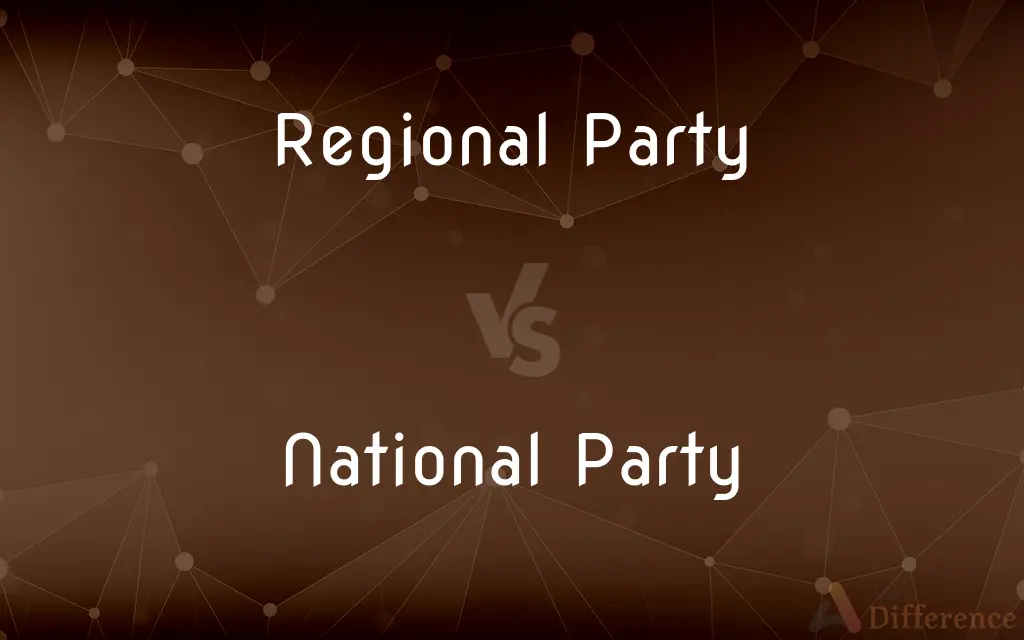Regional Party vs. National Party — What's the Difference?
By Tayyaba Rehman — Published on December 9, 2023
A Regional Party primarily focuses on interests of a specific region or state, while a National Party addresses concerns of an entire nation. Both play vital roles in democratic systems.

Difference Between Regional Party and National Party
Table of Contents
ADVERTISEMENT
Key Differences
The political landscape often features parties that cater to specific audiences or constituencies. A Regional Party, as the name suggests, is limited to a particular region or state, emphasizing local issues, traditions, and sentiments. Their influence and activities are mainly restricted to that region. Conversely, a National Party operates on a broader scale, aiming to represent the entire nation's interests. Such parties work on nationwide policies, national defense, foreign affairs, and other issues that affect the country as a whole.
While a Regional Party might focus on regional development, local languages, or culture-specific matters, a National Party would generally have a comprehensive manifesto catering to the diverse needs of the entire country.
Both types of parties have their unique importance: while National Parties shape the overall direction of a country, Regional Parties ensure that local voices and concerns are adequately represented.
Comparison Chart
Scope
Limited to specific regions or states
Covers the entire nation
Issues Focused
Local issues, regional development
National policies, defense, foreign affairs
ADVERTISEMENT
Electoral Presence
Contests elections mainly in a particular region or state
Contests elections across the country
Representation
Represents regional sentiments and concerns
Represents the interests of the entire nation
Influence
Influence primarily in regional governments
Influence in central or federal government
Compare with Definitions
Regional Party
A political organization focused on a specific region's interests.
The rise of the Regional Party ensured the state's unique culture was represented in the legislature.
National Party
Holds influence on a central or federal level in a country.
The National Party has been in power at the center for two consecutive terms.
Regional Party
A party with electoral presence mainly within a confined geographical area.
This Regional Party has never contested elections outside of its home state.
National Party
Often has a broad and diverse voter base from various regions.
The National Party's outreach programs target voters from coast to coast.
Regional Party
Represents political aspirations based on regional identities.
The Regional Party emphasized the preservation of the local language.
National Party
Focuses on issues of national significance and importance.
The economy's revival was the main agenda for the National Party this year.
Regional Party
Mobilizes voters based on local issues and sentiments.
The dam's construction was opposed by the Regional Party due to environmental concerns.
National Party
Contests elections across a wide geographical area, encompassing various regions.
The National Party secured seats in multiple states in the recent elections.
Regional Party
Influential mainly within its specific area of operation.
Despite its limited national presence, the Regional Party dominates local politics.
National Party
A political entity aiming to represent the entire nation's interests.
The National Party's policies on defense are comprehensive and far-reaching.
Common Curiosities
Do National Parties operate in every state or region?
While they aim for nationwide presence, National Parties might not be dominant in every region.
Can a Regional Party evolve into a National Party?
Yes, with expanding influence and wider voter appeal, a Regional Party can transition to a National Party.
Do Regional Parties have any influence nationally?
While primarily focused locally, a Regional Party can influence national politics, especially in coalition governments.
Can a National Party have regional wings or units?
Yes, National Parties often have regional units to address specific regional issues.
How do the goals of a Regional Party differ from a National Party?
While a Regional Party may prioritize local development and identity, a National Party focuses on broad national growth and unity.
Can a National Party focus on local issues?
Yes, while they have a broader focus, National Parties also address local concerns when contesting in regional elections.
How do Regional Parties impact coalition politics?
Regional Parties can be kingmakers in coalitions, influencing policies and ensuring regional representation.
Why are Regional Parties significant in a democracy?
Regional Parties ensure representation for local concerns and identities in larger political frameworks.
How do National Parties incorporate regional concerns?
They often collaborate with regional leaders, conduct local surveys, and engage with grassroots movements.
Why might voters prefer a Regional Party over a National Party?
Voters might feel a Regional Party better represents their local concerns and cultural identities.
Are Regional Parties only significant in larger countries?
No, Regional Parties can be significant in any country with diverse regional interests or identities.
What challenges do National Parties face?
National Parties must cater to diverse regional needs while maintaining a cohesive national policy.
Share Your Discovery

Previous Comparison
Fayol’s Management Theory vs. Taylor’s Management Theory
Next Comparison
Computer Engineering vs. Information TechnologyAuthor Spotlight
Written by
Tayyaba RehmanTayyaba Rehman is a distinguished writer, currently serving as a primary contributor to askdifference.com. As a researcher in semantics and etymology, Tayyaba's passion for the complexity of languages and their distinctions has found a perfect home on the platform. Tayyaba delves into the intricacies of language, distinguishing between commonly confused words and phrases, thereby providing clarity for readers worldwide.














































